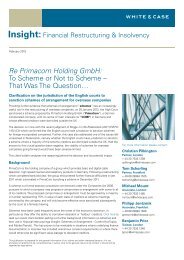Mexican Legal Framework of Business Insolvency - White & Case
Mexican Legal Framework of Business Insolvency - White & Case
Mexican Legal Framework of Business Insolvency - White & Case
Create successful ePaper yourself
Turn your PDF publications into a flip-book with our unique Google optimized e-Paper software.
18<br />
areas as to why an entity (the Federal Institute <strong>of</strong> Specialists in Commercial <strong>Insolvency</strong>)<br />
was implemented with the purpose <strong>of</strong> the latter to authorize those persons who meet the<br />
requirements to serve as visitor, conciliator or receiver. However, the same LCM Bill clearly<br />
states the idea, materialized in Article 7 <strong>of</strong> the LCM, that in the insolvency proceedings, the<br />
judge is the central and governing body <strong>of</strong> the process, since the process requires intervention<br />
<strong>of</strong> the judicial authority to comply with the formalities <strong>of</strong> due process. Therefore, such institute<br />
is only an auxiliary and essentially administrative body that must be maintained at the margin<br />
<strong>of</strong> a direct intervention in insolvency proceedings, as envisioned by the lawmaker.<br />
a. The Judge<br />
Only federal courts sitting in the domicile <strong>of</strong> the debtor have jurisdiction over insolvency<br />
proceedings [LCM 17]. This jurisdiction rule raises two issues: one, on the exclusive<br />
jurisdiction <strong>of</strong> federal courts; and another, on the domicile <strong>of</strong> the debtor.<br />
i. Exclusive Jurisdiction <strong>of</strong> Federal Courts<br />
While the Federal Congress has the exclusive authority to pass commercial laws<br />
[CPM 73-X], for historic reasons federal and local courts have concurrent jurisdiction<br />
on commercial disputes [CPM 104-I]. This situation has prompted discussion<br />
regarding the constitutionality <strong>of</strong> the statutory exclusivity <strong>of</strong> federal courts in<br />
insolvency matters. Ovalle (2000) presents a clear explanation <strong>of</strong> the merits <strong>of</strong><br />
this discussion:<br />
To determine whether federal jurisdiction provided in Article 17 <strong>of</strong> the <strong>Insolvency</strong> Law violates<br />
[the constitutional principle <strong>of</strong>] concurrent jurisdiction, the type <strong>of</strong> interest affected by the<br />
insolvency process is the starting point. If one determines that only individual interests are<br />
the subject matter <strong>of</strong> such processes, the conclusion would be that there is in fact a violation<br />
to the alternative jurisdiction provided in Article 104, Section I, <strong>of</strong> the Federal Constitution. On<br />
the other hand, if one determines that not only individual interests are the subject matter <strong>of</strong><br />
this type <strong>of</strong> process, but rather that general, public or social interests are the subject matter<br />
there<strong>of</strong>, then the conclusion should be that Article 17 <strong>of</strong> the <strong>Insolvency</strong> Law does not violate<br />
the provisions <strong>of</strong> Article 104, Section I, <strong>of</strong> the Federal Constitution.
















